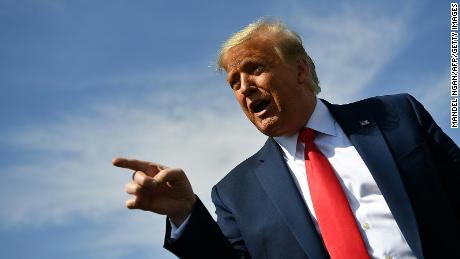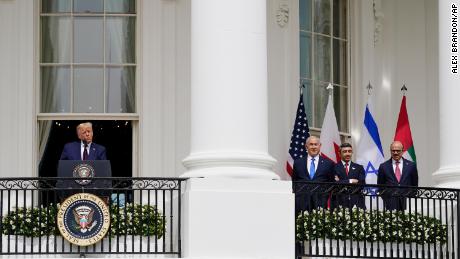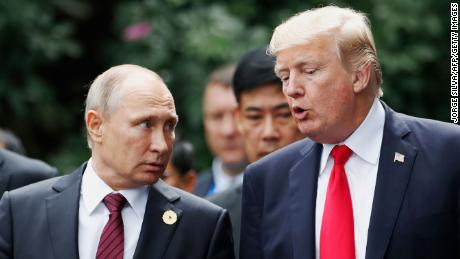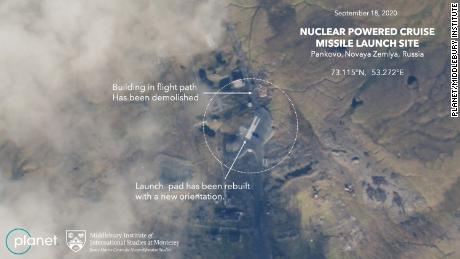Washington (CNN)Less than two weeks from Election Day, the Trump administration is working hard to secure foreign policy victories aimed at providing a last-minute boost in the polls.
Should Democratic hopeful and former Vice President Joe Biden win, then at the very least, President Donald Trump wants to leave a lasting legacy by imposing policies that will be hard for a Biden administration to reverse, two administration officials familiar with Trump's thinking said.
On Thursday, Trump and Biden are scheduled to face off in the second and final presidential debate -- which will include questions on foreign policy and national security issues. Two senior administration officials told CNN that the President is pushing to get a number of foreign policy initiatives completed -- even if only agreements in principle -- ahead of the election in the hope of piquing the interest of undecided voters, these officials said.
It's unclear how much these foreign policy initiatives will resonate with an electorate focused on the coronavirus pandemic that has claimed the lives of more than 220,000 Americans.
The Republican Party has long promoted American internationalism. But under Trump, many GOP voters have embraced his America First mantra and believe that the US should not get embroiled in costly wars with the President stressing the importance of bringing American troops home -- despite the widespread view among military leaders that a US presence abroad is essential for ensuring US homeland security. Trump has spun this into an immigration issue and largely put his foreign policy initiatives in the context of protecting America's borders -- something that resonates with his base.
Trump is also focusing heavily on issues that play well with evangelical voters, namely, pro-Israel policies. And he has doubled down on false accusations that Biden and his running mate, Sen. Kamala Harris, will transform America into a socialist nation -- a play that resonates with Cuban American and Venezuelan American voters in Florida.
After the Trump White House efforts to deliver a long-promised Middle East peace plan collapsed, his top advisers sought to shift their focus to more achievable goals, by brokering normalization talks between Israel and non-warring Arab states.
In recent weeks, top advisers working for the President successfully convinced a pair of Arab Gulf nations -- the United Arab Emirates and Bahrain -- to normalize ties with Israel. His administration wooed a swift signing with the UAE by granting its request for F-35 stealth fighter jets -- an initiative that ultimately would require congressional approval. According to one of the officials, the potential that a Biden win could result in renewed efforts to get a renewed Iran nuclear deal was key in their efforts to expedite talks before the November election. Israel has never been at war with the UAE or Bahrain, and they share a common interest in countering Iranian aggression in the Middle East.
The potential for a Biden victory was therefore front and center in those discussions, according to an administration official. The White House held a large signing ceremony on the South Lawn to commemorate the "historic" normalization agreements.
Similarly, efforts to broker normalization talks between Sudan and Israel hit a roadblock after the transitional government in Khartoum demanded a number of key concessions, including Washington's removal of Sudan from the state sponsor of terrorism list. On Monday, Trump announced his intention to do so, granting this key demand that now positions Sudan to deliver him a diplomatic victory ahead of the election.
Race for a nuclear agreement with Moscow
In the early days of his administration, Trump's persistent overtures toward Russia placed him increasingly at odds with his national security and foreign policy advisers, who urged a more cautious approach to dealing with the Kremlin. However, as he runs for reelection, many of those wary advisers have now left and those remaining have done little to contain Trump's instinct to embrace Russia as an ally.
With only weeks to go until the election, the Trump administration has renewed a push to finalize a nuclear agreement with Moscow, with significant concessions to its original position, hoping that a deal may force China to reconsider its position on trilateral arms talks.
The talks have opened the potential for a pre-election meeting with Russian President Vladimir Putin, despite continuous warnings from the US intelligence community that Russia is likely working to interfere in the upcoming contest, as it did in 2016.
The two sides reached an agreement in principle in mid-October, after months of disagreements over conditions laid out by the Trump administration, US officials said.
The race by the Trump administration to conclude talks with the Russians before Election Day is driven by several motivations. Trump has repeatedly signaled his interest in leaving the three-decade old New START agreement, designed to reduce the risk of war between Russia and the West.
Progress on these talks seeks to avoid the ultimate dismantling of the post-Cold War arms-control framework, already buffeted by the demise of the Intermediate-range Nuclear Forces Treaty, and the uncertain fate awaiting the New START accord on US and Russian long-range nuclear arms, which expires on February 5, 2021.
Putin and Biden have both said they would look to extend the treaty. Trump previously said he'd only agree to an extension if both sides also agree to freeze all warhead stockpiles. He also insisted that China be incorporated into any future deal -- something both China and Russia have responded to unenthusiastically.
Moscow first rejected suggestions that they had reached an agreement in principle. Then on Tuesday, its Foreign Minister announced that it is willing to agree to freeze nuclear arsenals in order to extend the arms reduction treaty New START if the US doesn't pose any other requirements.
The Russian Foreign Ministry added that it expects to hear from Washington the soonest if this deal "suits" the US side.
Anti-China push
And while Trump has consistently taken a tough stance on China, imposing a series of tariffs on Beijing as part of his trade war leading up to the signing of a Phase 1 trade deal in January, his efforts have ramped up significantly in recent months in an effort to repair the damage incurred to his electability in the wake of the Covid-19 pandemic.
Since March, Trump has taken a series of bruising actions against Beijing, including the deployment of aircraft carriers to the South China Sea and strictly regulating China's technology companies. In July, his administration closed China's Houston consulate over alleged espionage and sought to ban popular Chinese apps from the US market.
And this month, the Trump administration has alerted Congress of its intent to move forward with three advanced weapons sales to Taiwan.
From a messaging standpoint, Trump has made China public enemy number one, blaming Beijing's inaction and lack of transparency for the deadly pandemic and sidestepping criticism that his own administration politicized public health initiatives and failed to take swifter action to close the country.
The President is also expected to spin the narrative on several key foreign policy topics ahead of the election. Despite numerous attempts to get a denuclearization deal with North Korea, those talks have fallen by the wayside and Pyongyang has virtually stopped communicating with Washington, according to a US official.
Trump has repeatedly said that his talks alone staved off the potential for war with North Korea -- and that the US was on the brink during Barack Obama's presidency. In fact, tensions piqued during the Trump presidency, when the President promised to deliver "Fire and Fury" against North Korea in August 2017, if it endangered the US. He also referred to North Korean leader Kim Jong Un as "Rocket Man.
He later conceded that they "fell in love" after meeting.
The President is likely to refer to his Israel normalization initiatives as "Middle East peace" during Thursday's debate, although the original peace plan had intended to involve the Palestinians, and the countries that have signed normalization deals were never at war with Israel.
Trump is also likely to discuss the withdrawal of troops from places like Syria, Iraq and Afghanistan.
A number of forces remain in Syria and have been committed to helping local allied forces protect local oil refineries and other strategic installments, but the US did not "keep the oil," as Trump repeatedly has said. And, while the President has vowed to withdraw US troops from Afghanistan, that issue has been subject to intense mixed messaging and debate among some of his key national security advisers.









